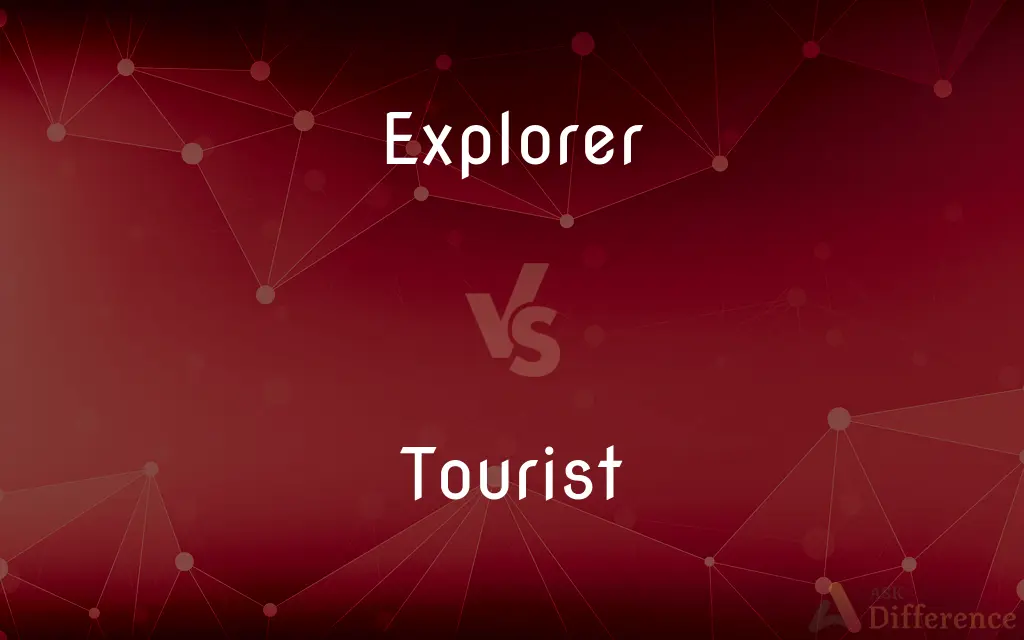Explorer vs. Tourist — What's the Difference?
By Tayyaba Rehman & Maham Liaqat — Updated on May 14, 2024
Explorers seek to discover unknown regions and gather knowledge, often facing risks, whereas tourists travel primarily for pleasure, visiting well-known destinations.

Difference Between Explorer and Tourist
Table of Contents
ADVERTISEMENT
Key Differences
Explorers are driven by the desire to chart uncharted territories and expand human knowledge about remote or unknown areas. Whereas tourists are motivated by relaxation and entertainment, focusing on visiting popular and accessible destinations that are often well-documented and safe.
Explorers often undertake journeys that involve significant risks and challenges, such as extreme weather conditions, rough terrains, or unexplored regions. On the other hand, tourists typically choose comfortable and convenient travel options, prioritizing safety and ease of access.
Explorers contribute to scientific, geographic, or historical knowledge, documenting their findings for academic and research purposes. In contrast, tourists generally seek personal enrichment and memorable experiences, capturing their travels through photos and souvenirs rather than detailed research.
Explorers require specialized skills, equipment, and preparation to handle unexpected situations and harsh environments. Whereas tourists can travel with minimal preparation and rely heavily on the tourism industry to provide amenities and structured itineraries.
Explorers are often sponsored by academic or research institutions and may have specific objectives or missions to accomplish. Tourists, however, usually fund their own travels and their activities are self-directed, focused on leisure rather than discovery.
ADVERTISEMENT
Comparison Chart
Motivation
Discovery and knowledge acquisition
Leisure and entertainment
Typical Destinations
Remote, uncharted, or challenging regions
Well-known, popular, accessible locations
Risk Level
High, due to unknown factors
Low, with a focus on safety and convenience
Contribution
Scientific and geographical insights
Economic support to local tourism industries
Preparation and Skills
Extensive, with a need for survival skills
Minimal, often relying on travel agencies
Compare with Definitions
Explorer
A pioneer in any field pushing the boundaries of knowledge.
He was an explorer in the field of quantum computing.
Tourist
A consumer of leisure activities in different locations.
She identifies as a tourist when exploring new cuisines.
Explorer
Someone who investigates unfamiliar areas.
As a cave explorer, she maps underground systems.
Tourist
A person who travels for pleasure, especially abroad.
Millions of tourists visit Paris each year.
Explorer
A person who travels to unknown places to learn about them.
The explorer charted the untouched islands of the Pacific.
Tourist
A visitor to a place of interest or attraction.
The castle attracts thousands of tourists during the summer.
Explorer
A researcher involved in discovering new findings.
He is an explorer of deep-sea ecosystems.
Tourist
A participant in guided travel experiences.
As a tourist, he prefers organized tours.
Explorer
A person who explores a new or unfamiliar area
A polar explorer
Tourist
One who travels for pleasure.
Explorer
One that explores, especially one that explores a geographic area.
Tourist
Someone who travels for pleasure rather than for business.
Explorer
An implement or a tool used for exploring; a probe.
Tourist
(derogatory) One who visits a place or attends a social event out of curiosity, wanting to watch without commitment or involvement.
Explorer
One who explores something
Tourist
A member of the visiting team in a match.
Explorer
A person who by means of travel (notably an expedition) searches out new information.
Tourist
A guest user on a computer system.
Explorer
Any of various hand tools, with sharp points, used in dentistry.
Tourist
One who makes a tour, or performs a journey, especially for pleasure.
Explorer
A visual representation of a file system etc. through which the user can navigate.
Tourist
Someone who travels for pleasure
Explorer
One who explores; also, an apparatus with which one explores, as a diving bell.
Tourist
A seasonal visitor to popular destinations.
Tourists flood the coastal towns each July.
Explorer
Someone who travels into little known regions (especially for some scientific purpose)
Explorer
An adventurer who seeks new experiences in obscure locations.
She became an explorer to satisfy her curiosity about the Arctic.
Common Curiosities
What drives an explorer to travel?
Explorers are motivated by the pursuit of knowledge and the challenge of the unknown.
What kind of risks do explorers face?
Explorers face significant risks, such as extreme environments or unknown hazards.
What contributions do explorers make?
Explorers contribute to scientific and geographical knowledge.
What impact do tourists have on the places they visit?
Tourists economically support the places they visit through spending on accommodations, attractions, and services.
What preparations do tourists generally make?
Tourists often make minimal preparations and rely on tourism services.
How do tourists ensure their safety?
Tourists typically choose destinations known for safety and rely on the tourism industry for secure travel arrangements.
Can someone be both an explorer and a tourist?
Yes, one can switch between being an explorer and a tourist depending on the purpose and nature of their travels.
What is the primary motivation for a tourist?
Tourists travel primarily for relaxation and enjoyment.
How do explorers and tourists differ in their choice of destinations?
Explorers seek remote or uncharted areas, while tourists prefer popular and accessible locations.
What skills are necessary for an explorer?
Explorers need survival skills, specialized knowledge, and adaptability.
How do explorers document their travels?
Explorers document their findings in detailed reports and scientific documentation.
What do tourists typically take back from their travels?
Tourists often take back souvenirs, photos, and personal experiences.
Share Your Discovery

Previous Comparison
Cyme vs. Corymb
Next Comparison
Calmness vs. QuietnessAuthor Spotlight
Written by
Tayyaba RehmanTayyaba Rehman is a distinguished writer, currently serving as a primary contributor to askdifference.com. As a researcher in semantics and etymology, Tayyaba's passion for the complexity of languages and their distinctions has found a perfect home on the platform. Tayyaba delves into the intricacies of language, distinguishing between commonly confused words and phrases, thereby providing clarity for readers worldwide.
Co-written by
Maham Liaqat











































